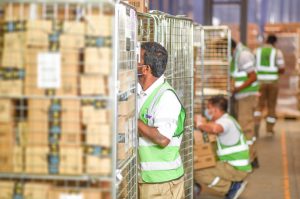Vibha Mehta, Editor of Logistics News ME, speaks with Rodrigue Nacouzi, CEO and Founder of Transcorp International where they discuss about the business, regional logistics landscape, client concerns, and much more…
Transcorp Intl, a Logi-Tech firm headquartered in Dubai since 2013, serves the markets in the UAE and KSA. The business adopts a B2B2C business model that addresses the omnichannel difficulties of the logistics sector’s temperature controlled ‘First, Middle, and Last Mile services.’
Additionally, the company is known for its distinctive temperature-controlled last-mile delivery programmes supported by cutting-edge technology that gives its end-users the most visibility and flexibility. By reducing waiting times, expanding delivery windows to four per day, and attaining an average success percentage of 98.2% for guaranteed next-day deliveries, Transcorp has been on a mission to disrupt and change the delivery standards for the last-mile services in every location it operates in. Transcorp also provides a specific same-day delivery option in addition to its usual services, which is popular and necessary for millennials.
With 16 warehouses dispersed around the region, Transcorp boasts one of the largest fleets of temperature-controlled ‘Coolest Van in Town’ vans. Transcorp’s activities are supported by the largest food and beverage fulfilment centre in the region, which has a storage capacity of 40,000 bins and can handle +100,000 SKUs (stock keeping units). Likewise, its main fulfilment centre in Dubai has a daily capacity of 15,000 orders, but during the peak month of November, this capacity rises to 25,000 orders.
![]() Beyond its core services, Transcorp covers the whole spectrum for online businesses, assisting such enterprises in navigating the complex logistical landscape. Correspondingly, Transcorp’s cutting-edge technology offers a wide range of advanced logistics services, from high visibility to interconnectivity and controlling returns, to satisfy the complex logistical needs of its different customers.
Beyond its core services, Transcorp covers the whole spectrum for online businesses, assisting such enterprises in navigating the complex logistical landscape. Correspondingly, Transcorp’s cutting-edge technology offers a wide range of advanced logistics services, from high visibility to interconnectivity and controlling returns, to satisfy the complex logistical needs of its different customers.
![]()
![]()
![]() Transcorp Intl’s Unique Offerings
Transcorp Intl’s Unique Offerings
Among Transcorp’s exclusive offers are: 5 daily delivery windows (instead of the industry standard of 2); 7 days a week, 16 hours a day; 98% of deliveries are successful; 3 delivery options, including next-day, same-day, and express delivery services; and live data sharing with API/Plugin integrations. Transcorp complies fully with all business regulations and company policies as well as with global standards for corporate governance. Having said that, Transcorp International consistently leads the industry with exceptional compliance and speed, one of the key factors contributing to its success.
Transcorp Intl believes in combining resources to generate mutual interests. “We operate in a fast business environment where companies need to evolve and develop new products and services constantly,” says Rodrigue Nacouzi, CEO and Founder of Transcorp International. Thus, the team at Transcorp are constantly developing their strategic alliances – be it aggregating unused resources and speeding up the development of new services or streamlining market penetration costs and reducing unnecessary competition. Rodrigue believes that nothing is more illuminating and fruitful than a solid ecosystem – because of that, strong strategic alliances have helped Transcorp forge strong partnerships and a community-like environment in their discipline. “We are proud to have spearheaded this initiative since it has proven to all parties how beneficial it is to create synergies,” adds Rodrigue.
Whereas, for their KSA operations, Transcorp partnered with local distributors with excess and unutilised capacity (in their warehouses and fleet). A hybrid aggregation model that enables the company to create a short supply chain when an urgent demand is required. “The results were brilliant and helped our company to moderate its investment on CAPEX (while we plug & play) and generated sizable income from an unused capacity for our local partners,” said Rodrigue. Moreover, the above steps are completed through a user-friendly interface that saves time and money and eliminates the troublesome process of a traditional distributor. Rodrigue continued by saying that the firm has had +220% growth, thanks to their improved methods over the last four years. This attests to the accomplishment of the vision, objectives, and strategic partnerships that Transcorp has effectively designed, executed, and sustained.
The Current Supply Chain And Logistics Landscape In The Region
The country’s or region’s overall supply chain and logistics environment provide excellent visibility into the region’s unique environment, how it functions, and what the prospects are. In 2025, the MENA region’s temp-controlled e-commerce industry is expected to reach $6 billion, with Egypt, Saudi Arabia, and the United Arab Emirates accounting for 87% of the sector’s revenue. “We have observed a change in consumer behaviour towards e-commerce purchasing during the post-COVID era, which strengthened the first and last mile sectors.” According to analysis, e-commerce will increase rapidly between 2020 and 2022, with a CAGR of 20%, and then gradually until 2025, at a CAGR of 14%. It should be noted that before Covid, the same growth was predicted to increase by 14% and 10% gradually, respectively.
Widespread e-commerce practices are what are causing the logistics industry in the GCC to accelerate digitally. Strong purchasing power resulting from a high per capita income, improved logistical systems and infrastructure, digital literacy, and increased internet usage are the main driving forces behind this development.
With a strong logistics and supply chain industry, the UAE economy continues to expand steadily. Businesses are increasing their online channel investments, particularly in q-commerce. Only 7.8% of the nation’s whole food sector is currently available for online orders, although the online grocery business in the UAE expanded by around 50% in 2021 and is projected to produce $1.6 billion by the end of the year.

Whereas, the Kingdom of Saudi Arabia is outpacing UAE (38% CAGR) in GCC e-commerce growth, with a growth rate of 39%. The fashion and beauty industries have experienced phenomenal development and are now among the most popular, competitive, and rapidly expanding e-commerce sectors. The Kingdom is focused on the innovation of three essential areas: digitisation, infrastructure, and e-commerce, in order to take advantage of the logistics sector’s untapped potential and support domestic growth.
According to the government’s Vision 2030 initiative, the growth of Saudi Arabia’s logistics industry may be ascribed to the country’s three primary industries’ rising logistical needs: food and beverage, pharmaceuticals, and internet enterprises. “By continuing to invest in the innovation of these industries, as well as the adoption of digital solutions to overcome pre-existing challenges, Saudi Arabia hopes to turn into a regional logistics and e-commerce hub,” adds Rodrigue.
The latest buzzword is supply chain disruption. The logistics sector captured everyone’s interest in COVID-19. Manufacturers, warehouse providers, transporters, and retailers need more time to fix their deadlines nowadays and require innovative solutions.
The previous two years have been crucial in shaping Transcorp’s new strategy, from addressing supply chain interruptions to developing new omnichannel fulfilment techniques. “Being at the hub of the supply chain, we took this challenge to new levels and created new procedures, cutting-edge supply and demand strategies, and improved technology to address the issues with the new timely deliveries. Moreover, businesses in our field must constantly innovate to be competitive and keep up with the ever-changing technologies. Greater reach, quicker deliveries, and more affordable options are constantly in demand,” states Rodrigue.
“We had to overcome such challenges by developing a hybrid aggregation strategy without compromising quality and compliance when e-commerce in the region witnessed unexpected development. This concept is crucial in the current environment and is increasingly important in the cutthroat e-commerce market. With their growth in orders, our clients began significantly benefiting from lower prices. In addition, we have increased our presence in new markets, supported the development of regional emerging companies, and kept entrepreneurship inspiring.”
Parallel to this, Transcorp has noticed a fall in international trade and investment. They contend that significant recent events—including Brexit, the conflict in Ukraine, supply-chain disruptions, and the world energy crisis—have ushered in a brief period of deglobalisation. With the appropriate sourcing and strategic alliances, emerging nations will have the chance to move up the income ladder more quickly.
It is believed that businesses in the area no longer maintain a lean inventory model with a low stock level sufficient to fulfil demand. Instead, they have begun to shift how they view stock keeping. They have started hoarding more to be ready in case of another supply chain issue. “The shift from ‘just in time’ to ‘just in case’ has significantly increased our warehousing services, which has naturally had an impact on our delivery volumes,” remarks Rodrigue.
Customers Expressing Their Biggest Concerns
By 2040, it is estimated that 95% of transactions would take place online. “It’s time for retailers to face e-commerce problems and find solutions. As more customers rely on online shopping, in my opinion, a new window of opportunity will open for company leaders,” continues Rodrigue.
Capitalisation of Tech and Data
As we know, retailers were not prepared to manage the high number of transactions brought on by the COVID e-commerce boom, especially given the numerous integration touchpoints that every platform will have, such as payment gateways, shipping solutions, procurement and sourcing, and much more. Online channels stopped being a wholly integrated element of the firm then and turned into a side gig. Moreover, companies need to focus on implementing synchronised solutions, and here is where Transcorp may play a crucial role through its plugins, layers, and APIs – as the appropriate blend is required to connect internet channels to other business divisions.
However, with the proper solutions, data should be consistently collected at all touchpoints and put to the best possible use. Similarly, Transcorp assists companies with data analysis to better understand trends, consumer behaviour, and the ideal time to launch their subsequent marketing initiatives.
Customers Acquisition and Retention
Among other things, having the correct tools is essential for engaging with your consumers effectively. Keep your current customers satisfied using tech tools, sometimes called customer service or logistical tools, that automate your activities. “In the long term, I think client retention is much more crucial and effective than customer acquisition,” says Rodrigue. However, surveys reveal that 50% of businesses continue to give the acquisition component priority. “This may result from investors’ pressure on businesses to gain new clients.” Yet, according to 70% of the executives of those businesses, keeping current customers is more cost-effective than finding new ones. Transcorp’s client retention programme has demonstrated its effectiveness with a less than 3% churn rate.

Logistics Cost
In the Gulf, the transportation industry is mainly dependent on fuel. In addition to considerable rises in the price of fuel, the cost of package delivery is increasing at an unprecedented rate. All parties must understand the interconnectedness of cost increases. For instance, raw materials also increase in price as oil prices do. Additionally, in a domino effect, when the price of raw materials rises, so do the prices for logistics and transportation. “You’re going to see that inflation reflects in the cost of goods and services to include first, middle, and last mile services as long as we have underlying inflation across the global economy.”
Landlords are hesitant to approve new long-term leases based on the present market prices. Therefore, signing a short-term lease now is in their best interests. “This dynamic will continue to pressure warehouse rent, which will affect the cost of warehousing services. The recent changes will significantly impact E-commerce retailers and their e-commerce fulfilment.” The tenuous supply chain, workforce shortage, and rising costs will make e-commerce fulfilment orders more challenging to complete. One important aspect is that online retailers must place product orders far in advance if they want to guarantee adequate stock levels and prevent stock-outs, which will also raise their storage expenses.
Customer Expectations & Reviews
The primary issue for internet firms nowadays is to keep customers satisfied with prompt deliveries of high-quality goods. Some companies have gone as far as promising clients’ deliveries within a 10- to 15-minute window. “However, they rarely delivered on their promises, which left customers dissatisfied and businesses unable to live up to expectations. Transcorp makes it a priority to have openness, responsibility, and trust at the core of all our business dealings. This means that we guarantee our client’s satisfaction and prompt delivery of our services.” Notably, this has had a significant and favourable impact on their consumers’ positive reviews of the services. Many of their clients have evolved into some of their finest advocates, complementing personal conversations, online reviews, and word-of-mouth offerings.
Pharma Logistics Solutions
For good reason, the pharmaceutical logistics industry ought to have the strictest regulations of all. The effectiveness of a product can be impacted by even the tiniest fault in shipping, storage, or delivery. In pharma logistics, control and quality are crucial. Following the pharmaceutical supply chain, best practices is essential to guarantee that goods are delivered quickly and securely. “Since the outbreak, we have seen an increase in pharmaceutical shops compromising the accuracy of their delivery. Considering that they are providing aggressive delivery services at no additional expense, their main concern is to safeguard their margins.” Resulting in subpar deliveries that disrespect industry standards, temperature control, and general package cleanliness.
“We support quick deliveries in the pharmaceutical sector, but only when done correctly! How often have we witnessed a bike in our area bringing a drugstore order in a shoddy insulated bag? This posed a threat to life. By improving the procedures of any temperature-sensitive items, we are collaborating closely with regulatory organisations to end those practices. We must guarantee complete traceability. At Transcorp, we uphold the ethical pharmaceutical distribution methods supported by strict compliance standards.”
Strategic Alliances In 2023
Transcorp’s stakeholders, who are as eager as the team to expand regionally as an ecosystem, are also enthused by the company’s expansion strategy. With growth strategies, Transcorp’s plans for the region are extensive and follow the company’s objective of becoming an innovative global cold-chain player, beginning with Qatar in Q2 2023, followed by the debut of Kuwait in Q4 2023, and Egypt is scheduled for Q3 2024. “We regard every day as an opportunity to move the company and its employees one step closer to a bright future. Our goal is to create a business where employees can prosper along with the business,” said Rodrigue.
In 2023, Transcorp will continue building and sustaining strategic alliances within the industry. “We believe in collaborative growth by developing and scaling our ecosystem. A new vertical will be launched, automation will be introduced, and further green initiatives will be added.”
New Vertical – Dark Stores
Due to the pandemic, the market shifted from large-scale supermarket purchases to individualised pick-ups delivered to the client’s doors. Around 79% of consumers switched to online grocery shopping during the epidemic, and more than 47% anticipate keeping this change. The online grocery market in the UAE rose by roughly 73% in 2020.
The major players in the UAE market converted a portion of their online sales to offline sales and began delivering goods in 20 minutes or less to populated locations around the UAE and KSA.
Transcorp will redefine the dark store business models in the region by providing a more excellent selection of goods, which benefits both the merchant and the end-user by giving them more options within realistic delivery windows. “Since we favour sustainable models, we won’t try the careless free delivery in 20 minutes model. Our research and analysis indicate that couples and families prefer a 90-minute delivery for large basket sizes.”
Warehouse Automation
In order to achieve a fully automated operation by 2025, “our R&D team is significantly invested in introducing new automation to our warehouse business unit.” The automation plans are meant to boost accuracy and efficiency while enhancing worker safety. Automation will help them process orders more quickly where humans are unable to match the accuracy and relentless pace of robots due to the on-demand model’s increasing popularity.
“Another objective for our R&D team is to improve space optimisation within our warehouses, allowing us to utilise every square inch of space within our warehouses. We will make our racks more space-efficient by converting wider aisles to compact ones with the aid of Automated Guided Vehicles (AVGs),” explains Rodrigue. With these technologies, Transcorp’s warehouses will be able to make more money from their cubic metres by needing less time and space to choose, pack, and ship online orders.

Initiative for Climate Change
The largest domestic source of climate change is the transportation industry. This sector produces more greenhouse gas emissions than any other in the economy.
“We consider climate change to be a difficult task that calls for coordinated and collaborative efforts.” Real solutions will necessitate global action, but Transcorp will make decisions in its daily operations to lessen its environmental impact. To address the issue and develop a strategy to achieve net-zero carbon emissions by 2050, our team has already started several Environmental, Social, and Governance (ESG) projects.”
Some of the initiatives that the company already has in place are the following:
- Route Optimization is a vital tool in achieving the company’s goal of reducing CO2 emissions by 50% by 2030. A geocoder included in the technology automatically completes incorrect addresses that are collected by the system. “It also keeps an eye on traffic and notifies our drivers when there are roadblocks. According to our delivery philosophy, drivers should make more stops per run while travelling fewer miles.” Fuel emissions can be significantly reduced with an effective routing that includes exact addresses and clear directions.
- Space Optimisation: Optimisation of space Transcorp loads the vans to capacity on every journey to ensure that the movements of its vehicles are optimised. Using the proper equipment will ensure smooth van loading, which will result in fewer vans and full runs. “By doing this, we lessen the number of automobiles on the road and their last-mile emissions.”
- Fuel Sensors: in every Transcorp vehicle comes a fuel sensor to monitor fuel consumption. Their system will alert its administrators with any sudden fluctuation in fuel usage versus the mileage crossed.
- Returns: Returned packages “Returns” or failed deliveries strongly impact the environment since it means doubling the amount of transportation and its CO2 emissions into the atmosphere. With their advanced and efficient end-to-end communication tools, they managed to reduce the returns and unsuccessful deliveries by 60%
- Sustainable Packaging: As the e-commerce industry has grown, packaging manufacturing has also increased, leading to higher CO2 emissions. A package already causes environmental harm before it is securely delivered to the customer’s door. A single container can have up to nine types of packing materials; examples include tape, cardboard boxes, bubble wrap, paper wrap, and Styrofoam padding. All this extra packaging is thrown in the trash. To minimise plastic usage, “we are closely collaborating with our clients to offer easy-open packaging made of 100% recyclable cardboard. Transcorp uses packaging that is recyclable, compostable, and biodegradable. Our warehouse management system is equipped with all the necessary technological instruments to help us choose the appropriate package size for the goods.”
By 2025, Transcorp plans to launch a few new initiatives, including assisting universities with cutting-edge green logistics programmes, researching the viability of EV use in the area and the temperature-controlled industry, switching 25% of the power usage to solar energy for their warehouses, adopting waterless technology for carwashes, and constructing a water recycling system beneath for their carwash garage.
“We believe climate change provides enormous difficulties and great potential for improved and greener transportation systems,” says Rodrigue.
Lastly, entrepreneurship is increasingly seen as the ideal method to amass wealth while living life to the fullest in the YOLO economy. Finding the perfect product/market fit and building profitable businesses are challenging tasks. The journey has been idealised by the success of well-known tech entrepreneurs by the international media, yet there are more failures in those journeys than successes they need to be aware of. A discipline that has been upheld over time and involves regular ‘fire-fighting’ only to keep the business afloat defines the spirit of an entrepreneur. Whatever the nature of the issue, business owners must maintain composure and focus on solutions. Although there is no one-size-fits-all manual for successful entrepreneurship, it is essential to know where you are to concentrate on the activities that will have the most considerable positive effects on your company.
On an ending note, Rodrigue shares some wise thoughts saying, “New business owners should educate themselves about and concentrate on these two metrics: profitability and a solid cash flow. I strongly advise young entrepreneurs to do this. I had to learn it the hard way, but I’m willing to share it now. The importance of confidence in any entrepreneur’s journey is something I would want to emphasise. Things will work out if you always have confidence in yourself, welcome criticism, and adjust swiftly to market developments.”


